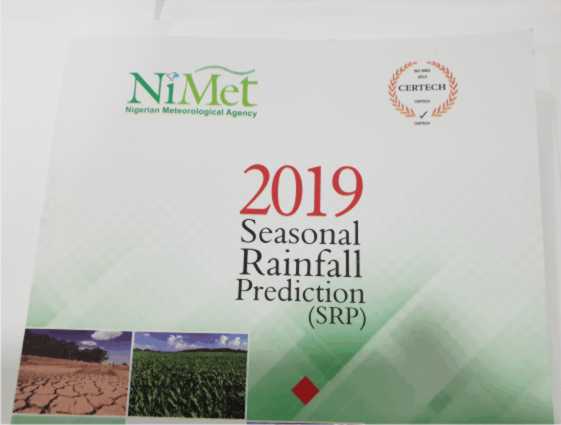The Nigerian Meteorological Agency (NiMet) has warned that Nigeria will experience below average rainfall during the 2019 rainy reason. The NiMet advice was contained in its 2019 Seasonal Rainfall Prediction (SRP) unveiled by Minister of State, Aviation, Senator Hadi Abubakar Sirika.
Presenting the NiMet 2019 SRP in Abuja, January 24, the minister advised farmers and stakeholders in the agriculture value chain across the country to stay in close contact with the NiMet during the course of year 2019 planting season in order to reduce incidences of crop losses.
Senator Sirika stated in his keynote speech while formally presenting the 2019 SRP and 2018 Climate Review, with the theme “Weather-Ready, Climate-Smart Economy: a Pathway To National Development,” that Nigeria “is expected to experience below normal- to-normal rainfall season.”
Speaking further, he said:
“The rains are expected to start late especially in the northern parts of the country while the south-eastern zone as well as the coastal areas will experience normal onset of the rains,” he stated, adding that “most of the northern states will experience earlier than normal end growing season.”
Although a period of below-normal rainfall does not necessarily result in drought conditions, it is note taking precautions especially given the increasing incidences of climate change and the resultant low crop yields when there is below-average rainfall.
While revealing that “shorter length of the growing season is predicted for most parts of the country,” the minister said “dry spells during the raining season will be more frequent and severe,” predicted to last between 10 and 18 days in some parts of the extreme north in the months of June and July, saying the ‘little dry season’ commonly known as ‘August break’ in parts of the south “is expected to be pronounced.”
Giving the foregoing therefore, the minister advised:
“These are risk factors for farmers in the affected areas and have to be carefully and scientifically managed.”
Speaking further, he emphasised that “it is necessary to state that the expected below normal- to-normal rainfall in parts of the country does not rule out the possibility of isolated flash floods due to high intensity of rainfall at the peak of the season, especially in places that are naturally prone to flooding.”
As a result therefore the minister said: “It is important to note that in every season, dry spells occur and in certain cases, it leads to crop losses. In this regard, I wish to urge our farmers and other stakeholders to get in touch with NiMet to access meteorological advisories and updates within the growing season.”
Saying for the second year running the environment constituted “by far the greatest concern raised by global leaders” at the World Economic Forum’s Global Risks Report,” Sirika listed them to include “extreme weather, biodiversity loss and ecosystem, major natural disasters, man-made environmental disasters and failure of climate change mitigation and adaptation.”
According to him, the impact of climate change in Nigeria was evident in severe floods and storms “with attendant loss of lives and properties” in many states of the country. As a result therefore, he said the weather and climate information being produced by NiMet is “critical for combating climate change through adaptation and migration strategies.”
Commending NiMet for the consistent predictions over the years, the minister said the SRP “has gained national and international recognition, especially in water resources and agricultural sectors due to recorded impact by practitioners, such as improvement of the sector’s contribution to national GDP.”
Speaking further on the importance of the SRP, Sirika stated:
“It is imperative to note that the early release of this vital information before the beginning of the rainy season every year is not only to ensure effective harnessing of the climate resource, but to also guarantee minimal losses from associated hazards, which are becoming quite devastating in this era of climate change.”
He said NiMet has continued to acquire “more modern weather observing, monitoring and forecasting infrastructures” for more effective service delivery.
Earlier, NiMet’s Director of Applied Meteorological Services, Engr. Mailadi Yusuf Abba Misau, in an address of welcome, said the Agency was committed to providing “timely, accurate and reliable weather and climate information in order to guide policy and decision making as well as provide weather and climate advisories” to all stakeholders to contribute to the development of the nation.
He revealed that this year’s prediction includes “the health component that features malaria and meningitis forecasts for the entire country.”
According to Misau, NiMet also produces “a range of products and services, all through the year, that are essential for national development, particularly in agriculture, water resources management, disaster risk reduction, health, construction, transportation, telecommunications, power and energy, marine, oil and gas,” among others.

